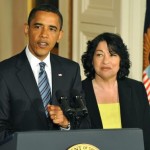
In a decision with unusually broad applications the Supreme Court has just ruled that statistical data alone (the test scores) is not sufficient evidence to constitute racial discrimination. Citing possible violations of the equal protection clause, the Supreme Court ruled in favor of the white firefighters of Connecticut.
Sonia Sotomayor, nominated to take Souter’s place, was one of three appeals court judges who ruled that officials in New Haven, Conn. acted properly in throwing out firefighters’ promotions exams because they scored much higher than black firefighters calling it “racial skewing.” In typical Obama administration fashion, Sotomayor was too much of a coward to write an opinion on the case to justify her position.
The so called “racial skewing” consisted of white firefighters getting higher grades because they spent their own money to buy books which they then studied many hours per day and aced the exams.
Sotomayor thus makes history again , this time by becoming the only nominee to the Supreme Court to be overturned by the Supreme Court during the nomination process.
This will definitely help those who question her qualifications and intelligence, giving further credence to reports from colleagues and clerks that she isn’t exactly the brightest crayon in the box. So far, Sotomayor’s claim to fame stems not from any brilliant legal opinions, but rather from the too numerous episodes of overt racism – the most famous being her declaration that “old latino women make better judges” or some other such crap.
Here is the post that I wrote about this situation. Amerikan-Dream, American Dream
Here are excerpts form the ruling
Held: The City’s action in discarding the tests violated Title VII. Pp. 16–34.
(a) Title VII prohibits intentional acts of employment discrimination based on race, color, religion, sex, and national origin, 42 U. S. C. §2000e–2(a)(1) (disparate treatment), as well as policies or practices that are not intended to discriminate but in fact have a disproportionately adverse effect on minorities, §2000e–2(k)(1)(A)(i) (disparate impact). Once a plaintiff has established a prima facie case of disparate impact, the employer may defend by demonstrating that its policy or practice is “job related for the position in question and consistent with business necessity.” Ibid. If the employer meets that burden, the plaintiff may still succeed by showing that the employer refuses to adopt an available alternative practice that has less disparate impact and serves the employer’s legitimate needs. §§2000e–2(k)(1)(A)(ii) and (C). Pp. 17–19.
(b)
Under Title VII, before an employer can engage in intentional discrimination for the asserted purpose of avoiding or remedying an unintentional, disparate impact, the employer must have a strong basis in evidence to believe it will be subject to disparate-impact liability if it fails to take the race-conscious, discriminatory action.
…
That is because the City could be liable for disparate-impact discrimination only if the exams at issue were not job related and consistent with business necessity, or if there existed an equally valid, less discriminatory alternative that served the City’s needs but that the City refused to adopt. §§2000e–2(k)(1)(A), (C). Based on the record the parties developed through discovery, there is no substantial basis in evidence that the test was deficient in either respect.
The City’s assertions that the exams at issue were not job related and consistent with business necessity are blatantly contradicted by the record, which demonstrates the detailed steps taken to develop and administer the tests and the painstaking analysis of the questions asked to assure their relevance to the captain and lieutenant positions.
JUSTICE KENNEDY delivered the opinion of the Court.
We conclude that race-based action like the City’s in this case is impermissible under Title VII unless the employer can demonstrate a strong basis in evidence that, had it not taken the action, it would have been liable under the disparate-impact statute. The respondents, we further determine, cannot meet that threshold standard. As a result, the City’s action in discarding the tests was a violation of Title VII. In light of our ruling under the statutes, we need not reach the question whether respondents’ actions may have violated the Equal Protection Clause
Find the ruling here
